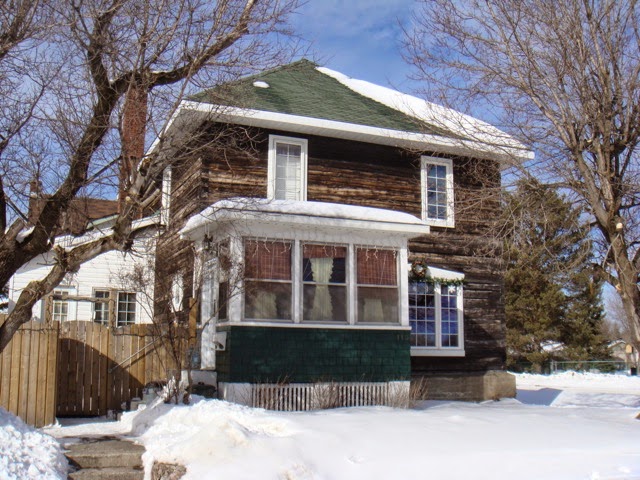 |
| Coach 'Tee' Chambers, Butch, Aldee Martel 1954 |
Harry writes with a note of sadness but also issues a challenge for the present and future of Chapleau. He has always been a great Chapleau booster,
Three members of the Pellow family arrived shortly after the CPR. They were John Henry (Harry) (1869-1918), (Harry's grandfather); Edgar Newton (1872-1952) and Alfred Edwin (1875-1956). Harry arrived in 1888 and was employed by the railway as an engineman. He lived in Chapleau until his death in 1918; Edwin came in 1898 and followed his railway career as a conductor in Chapleau, relocated to Fort William, moved again to Chapleau for a few years and finally to North Bay; Edgar arrived in 1900 and created a lasting lifetime legacy of entrepreneurial accomplishments until his death in Chapleau in 1952.
"Our grandfathers and their children, then their children, their children’s children and now even another generation are still closely aligned with Chapleau and the railroad and it is so disappointing to read of the demise of industry, connectivity which the railway provided, personal attachment to life in the north and Chapleau in particular; and a loss of identity and personality that the community was once known for. It is time for Chapleau as a community to refocus before it is too late.
 |
| C.A. 'Bill' Pellow (Butch's Dad) on delvery |
"In the beginning it was trees and water that drew the CPR through Chapleau -- Trees for the stokers and water for steam. Then as the tracks were laid and men and labour arrived to fulfill the National Dream, accommodation was required and with it families, housing, schools, churches, meeting places, an opera house, sidewalks: a master plan to lay out the streets and sidewalks and locate businesses and residences appropriately.
"The railway was the catalyst and it all started with the construction of the rail yard, the station building and maintenance and servicing facilities. Circa 1886, the essentials had only begun with broadly spaced trackage, an original station and a water tower.
"By 1910 things were in full swing and by 1911 there was a formal station building in the CPR style. Chapleau was a divisional point, housed train crews, provided housekeeping and maintenance for trains, marshalled trains and was a stopping point for passengers moving back and forth across the country.
"In these early days men and families were focussed on a new beginning. They were building their own homes, creating new industries and businesses as exemplified for example by the entrepreneurial drive of Edgar Pellow. Hotels for labourers, employees and travellers were constructed and schools were built and churches were constructed for several denominations.
.jpg) |
| original water tower |
 |
| Henry Pellow log house Birch and Grey |
"Chapleau depended totally on the Railway for its survival but pioneering instincts ensured that it would survive and the town prospered through its first 100 years.
 |
| Children on parade with J M Shoup far right |
"We read of grocers, launderers, delivery services, fur trading, purveyors of produce including food, lumber, and household goods of every kind; establishment of hotels and restaurants, and rooming houses/
.jpg) |
| Partying Down the Lake at Pellow/Rose camps |
"Chapleau was born of the Railway and nurtured by its pioneers in search of opportunity, unafraid of the unknown and adventuresome in the extreme. There is an enormous story still to be told.
 |
| Tom Corston, MJM, Olive McAdam, Bob Fife,Marg Fife, Dr Bill, Sonia Lucas 2012 |
"There is also an enormous challenge to ensure the future of Chapleau that may require adventuresome leaps into the unknown, as a pioneer in the 21st century. I wish you well."
 |
| Harry Pellow CHS Reunion 2012 |
Here is link to recent post by Butch on early days of railroading http://michaeljmorrisreports.blogspot.in/2014/07/cpr-running-trades-in-early-days-part.html
He was the architect for the Chapleau General Hospital, Chapleau Civic Centre, Cedar Grove Lodge, Chapleau Recreation Centre, the golf club house and Trinity United Church. Thanks Butch for sharing your insights. My email is mj.morris@live.ca
Thanks to Ian Macdonald, Dr. Bill Pellow, members of the Pellow family for research assistance and photros.
Thanks to Ian Macdonald, Dr. Bill Pellow, members of the Pellow family for research assistance and photros.





